Lights, camera, cars! Drive-in movie theaters are still rolling along
VINELAND, New Jersey − John "Doc" DeLeonardis didn't have a lot of time to talk.
The co-owner/operator of Delsea Drive-In − the last remaining drive-in theater in the state − was constantly in motion on a Saturday evening, guiding cars through the entrance and onto one of two fields where a pair of double features were set to begin.
The walkie-talkie at his side crackled with static and his employees' voices. Cars, trucks and SUVs rolled along dirt paths, navigating to spots marked by old, white speaker poles. Visitors gathered at picnic tables next to the concession stand, waiting for food and snacks they'd ordered through an online portal moments before.
A man in a truck bought two tickets in advance but came alone when his friend couldn't make it, an employee at the gate told DeLeonardis. The man asked whether his purchase could go toward someone else who didn't have a ticket. "Sure," DeLeonardis said. "And keep an eye out for single women for him," he added with a wink.
It's that kind of service that sets drive-in theaters apart from their corporate megaplex counterparts, said D. Vogel, vice president of the United Drive-In Theatre Owners Association and owner-operator of Bengies Drive-In Theatre in Middle River, Maryland.
The reason? Many of the almost 300 drive-in theaters across the U.S. are independently owned and operated, labors of love for people who are carrying on a nearly century-old tradition.
"Once you get this movie thing into your blood, it’s really hard to shake," Vogel said.
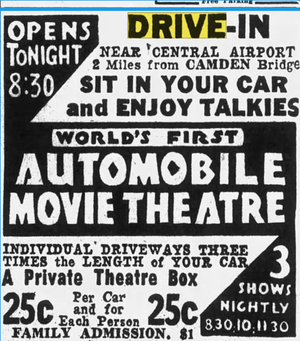
'Sit in your car and enjoy talkies'
The first drive-in sprung from the imagination of Richard Hollingshead, a New Jersey businessman who set up screens on a field on Admiral Wilson Boulevard, a thoroughfare connecting Camden and its suburb Pennsauken.
Ads in the June 6, 1933, edition of the Morning Post (now the Courier-Post) tell visitors they can "sit in your car and enjoy talkies": three shows nightly at 25 cents per car and 25 cents per person or $1 for a family admission. Drivers could park in "individual driveways three times the length of your car," a "private theater box" in "the world's first automobile theater."
The publication reported a few days later that 600 cars lined up for opening night at the theater, which Hollingshead built for $60,000.
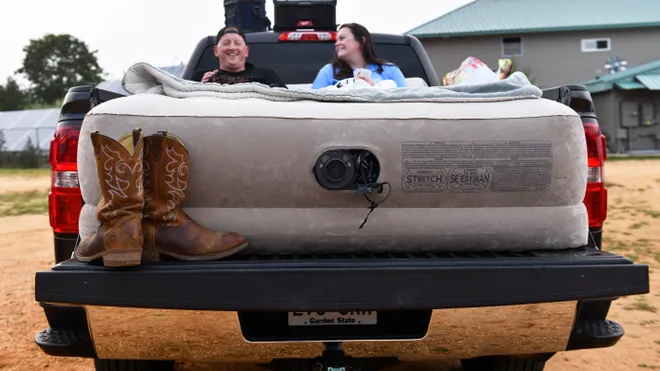
Vogel, the owner of Bengies in Maryland and vice president of the drive-in operators' group, has his own personal connection to the theaters' history: His stepfather, Jack K. Vogel, designed Bengies, as well as several other drive-in theaters from New Jersey to Ohio, and even one in Peru.
John Watzke is a third-generation theater operator, owner of Ocala Drive-In in Florida. His grandfather and father were both projectionists and the New Orleans native was one, too, before studios switched to digital formats (forcing theater operators to do the same).
"You have to have a passion for it," he said. "You won't get rich, though you can make a good living if you work hard."
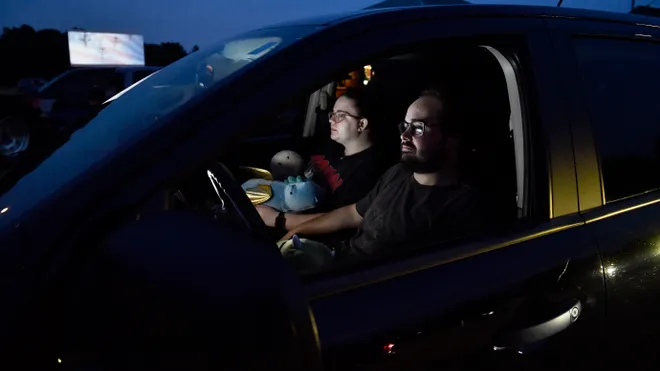
Not like an indoor theater
DeLeonardis, co-owner of Delsea Drive-In with his wife, Jude, works hard (and she does, too). His nickname, Doc, is no idle affectation: He is a pediatrician and Jude is a registered nurse. They're parents of four grown children: triplets and a son with special needs.
In 2003, they bought the drive-in, which originally opened in 1949 and closed 38 years later. After pouring a lot of sweat and monetary equity into the site in the woods off the road that gives the drive-in its name, the couple reopened it in 2004.
"My husband sees everything as a challenge," Jude DeLeonardis said. "And I’m the one in the dust behind him."
Running the drive-in "is a hell of a lot of work," she said. Challenges include keeping the drive-in adequately staffed; competition from indoor theaters and streaming; and the expenses involved in maintaining a sprawling outdoor site, concession stand, speakers, screens and other technology. Many theaters in temperate climates such as New Jersey's are able to operate only seasonally.
"We've survived 20 years, so there are a lot of people who come and really like us," she said. They've had to make adjustments, though: During the pandemic, they switched concessions to an online ordering model, one they've kept because it helps them keep things running more smoothly and helps limit waste. They've added a solar array and phased out plastics with their concessions as much as possible.
Jenna and Lewie Letts dropped the tailgate on their Dodge pickup as the sun began to set, and their daughters, 4-year-old Mila and 8-year-old Hailey, settled in to watch "Despicable Me 4" and "Inside Out 2" on one of Delsea's two screens. The family drove about an hour to Vineland from their home in Little Egg Harbor, something they used to do at least once a year. This was their first visit since the pandemic and Mila's first ever.
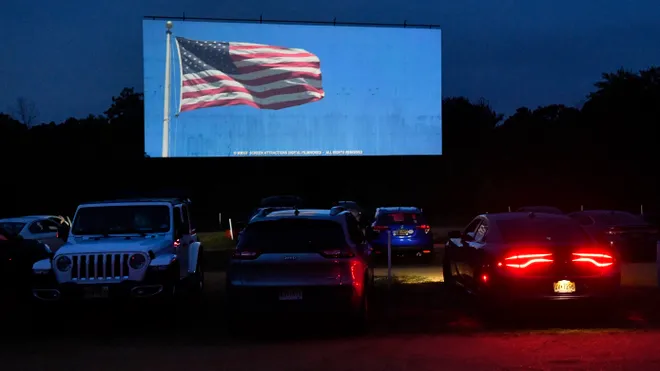
"We like it because the kids can move around a lot more," Lewie said. "They sure can't do that at an indoor theater."
"It's cheaper, too," said Jenna: $12.50 for the double feature, and children younger than 4 are admitted for free.
Danielle Albert and Jeffrey Michaels waited inside a Kia SUV for "Twisters" and "Deadpool & Wolverine" at the other screen.
"Drive-ins are awesome," said Albert, who recalled seeing movies at a Maryland drive-in, including the original "Twister," with her mother as a child.
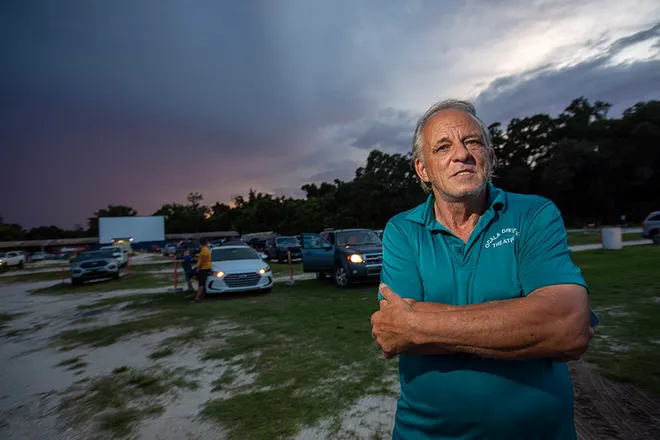
More than a movie. A memory.
Aaron Clark, general manager of the Ford-Wyoming Drive-In theater in Dearborn, Michigan, told the Detroit Free Press his childhood was spent "watching every big movie growing up at that theater." He began working at Ford-Wyoming as a child, selling tickets when he was as young as 7, working for his dad, Bill, who co-owned the business.
Aaron Clark, his brothers and other family members have each taken on different roles running the independently operated theater, and in 2021, Clark became a co-owner along with his father after the pandemic shuttered his construction business.
“For many, the drive-in serves as a place for people to come to escape their problems for a couple hours,” Clark said.
A summer ritual:Families flock to Dearborn's Ford-Wyoming Drive-In
Vogel said drive-ins' appeal "has a lot to do with" nostalgia. But it's more than that, he said. "When you come to a drive-in, there are other things to watch. I have the stars! No indoor theater can compete with that."
Watzke, the Ocala Drive-in owner, cites a "freedom" absent in indoor venues.. About 70% of his visitors are families with young children, and he tries to gear the first feature in each double to kids, and the second toward adults (though still appropriate for kids).
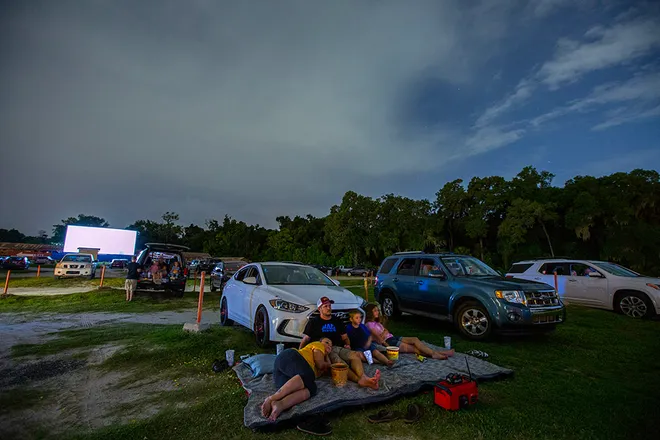
"You can't expect to walk into a theater with a little kid and enjoy it," he said. "Here, kids can come in their pajamas, they can play and make some noise, fall asleep if they're tired. You don't need to hire a sitter."
It was the family atmosphere that drew the DeLeonardises, then young parents, to buy Delsea Drive-In, Jude said. They had relocated from North Jersey to a much more rural area of South Jersey and found few family friendly places. They thought about opening a skateboard park.
"It was so peaceful, lots of trees, and we thought, this is like heaven here," she said. "There was one screen up and the remnants of a concession stand, and I said, kind of as a joke, 'We should bring back the theater.' My husband said, 'Yeah!' and he ran with the idea."
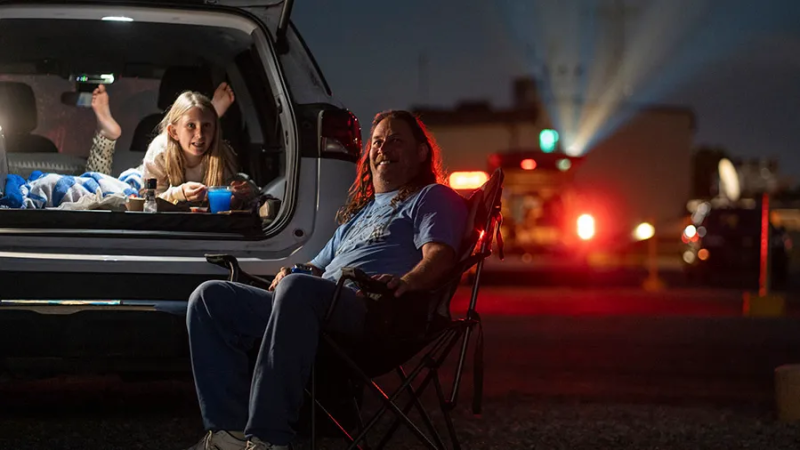
Watzke called drive-ins "kind of a time warp," a place where people put away their phones unless they're taking a snapshot of their kids or the sunset.
"You talk to someone of my generation," Watzke said, "and if they go to a walk-in theater, they remember the movie and not much else. But you ask them about going to a drive-in, they remember the car they drove, the people they were with.
"It's so much more than a movie. It's a memory."
Contributing: Sean Dougherty, USA TODAY; Ryan Garza, Detroit Free Press
Contact Phaedra Trethan by email at ptrethan@usatoday.com, on X (formerly Twitter) @wordsbyphaedra, or on Threads @by_phaedra
Disclaimer: The copyright of this article belongs to the original author. Reposting this article is solely for the purpose of information dissemination and does not constitute any investment advice. If there is any infringement, please contact us immediately. We will make corrections or deletions as necessary. Thank you.



